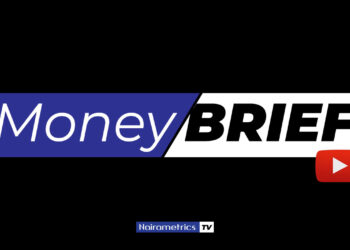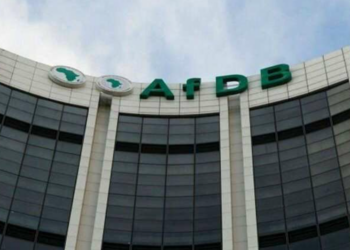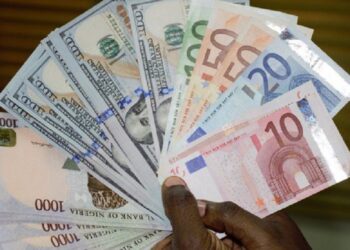Friday, 3rd December 2021: The exchange rate between the naira and the US dollar closed at N414.73/$1 at the official Investors and Exporters (I&E) window.
Naira appreciated against the US dollar on Friday to close at N414.73/$1, representing a 0.02% gain compared to N414.8/$1 recorded in the previous trading sessions as Nigeria’s external reserve increased by $69 million, the first time in over a month.
Forex turnover at the official market dropped by 37.4% to $139.67 million from $223.18 million recorded in the previous day.
However, the naira depreciated against the US dollar on Friday, dropping by 0.53% to close at N570/$1 as against N567/$1 that was recorded in the previous trading session. This is according to information obtained from BDC operators interviewed by Nairametrics.
Nigeria’s foreign reserve reduced by 0.09% on Thursday, 2nd December to close at $41.12 billion compared to $41.15 billion recorded as of the previous day. The recent decline in the nation’s external reserve is attributed to the intervention by the apex bank in the official forex market.
Trading at the official NAFEX window
The exchange rate at the Investors and Exporters window appreciated by 7 kobo to close at N414.73/$1 on Friday, compared to N415.8/$1 recorded over the past six trading sessions.
The opening indicative rate closed at N414.06/$1 on Friday, which represents a 12 kobo depreciation compared to N413.94/$1 recorded in the previous trading session.
An exchange rate of N461.27/$1 was the highest rate recorded during intra-day trading before it settled at N414.73/$1, while it sold for as low as N404/$1 during intra-day trading.
Forex turnover at the official window declined by 26.2% to $103.01 million on Friday.
According to data tracked by Nairametrics from FMDQ, forex turnover at the I&E window dropped from $139.67 million recorded on Thursday 2nd December 2021 to $103.01 million on Friday 3rd December 2021.
Cryptocurrency watch
The crypto market had a roller coaster weekend as Bitcoin plunged along with other cryptocurrencies, in another indication of the risk aversion sweeping across financial markets.
The world’s largest cryptocurrency, Bitcoin, dropped 0.63% to trade at $48,997.87 in the early hours of Monday after initially plunging by 20% to trade at $42,000 over the weekend.
The grim weekend cryptocurrency drubbing that dragged Bitcoin under $50,000 and ravaged other digital coins has decisively tempered the bullishness of investors, some of whom were predicting a run at $100,000 just weeks ago.
Fuelled by uncertainty over the Federal Reserve inching towards tighter monetary policy in the face of surging inflation, and global fears over the new Omicron variant of COVID-19, the dramatic crash was super-charged by liquidations in the crypto derivatives market, market players say.
Ethereum, the world’s second largest cryptocurrency by market capitalization dropped by 0.98% to trade at $4,160.10.
Crude oil price
Oil prices rose in the early hours of Monday with Brent crude going up by 2.03% to close at $71.30 per barrel after Saudis boosted the prices of its crude, signalling confidence in the demand outlook despite the spread of Omicron variant of the coronavirus.
The oil price gain is also buoyed by a diminishing prospect of a rise in Iranian export as indirect U.S.-Iran talks on reviving a nuclear deal appeared to hit an impasse.
On Sunday, Saudi Arabia raised January official selling prices for all crude grades sold to Asia and the United States by up to 80 cents from the previous month.
The price hikes were implemented despite a decision last week by the Organization of the Petroleum Exporting Countries and their allies including Russia, a group known as OPEC+, to continue increasing supplies by 400,000 barrels per day in January.
Oil benchmarks rebounded after falling last week for their sixth week in a row for the first time since November 2018 on concerns that the new coronavirus variant Omicron could impact global economic growth and fuel demand.
The West Texas Intermediate gained 2.14% to trade at $67.68 per barrel. However, Natural gas dropped by 7.14% to trade at $3,837 while OPEC Basket dropped by 2.23% to trade at $70.03 per barrel.
On the other hand, Nigerian crude, Bonny Light was up by 2.26% to trade at $70.68 per barrel.
External reserve
Nigeria’s external reserve dropped by 0.09% on Thursday, 2nd December 2021, to close at $41.12 billion. This represents a decrease of $36+.5 million compared to $41.15 billion recorded as of the previous day.
The consistent decline that had been experienced in the country’s reserve level could be attributed to the continuous intervention of the apex bank in ensuring the stability of the exchange rate.
It is worth noting that the nation’s foreign reserve had gained $5.99 billion in the month of October, as a result of the $4 billion raised by the federal government from the issuance of Eurobond in the international debt market.
In the month of November, Nigeria’s external reserve lost $633.47 million in value as against a gain of $5.99 million recorded in the previous month and $2.76 million gain in September 2021. On a year-to-date basis, the reserve gain has reduced to $5.74 billion.


















